Looking Up, 16-page English PDF Edition, Back Issues and Current Issue

|
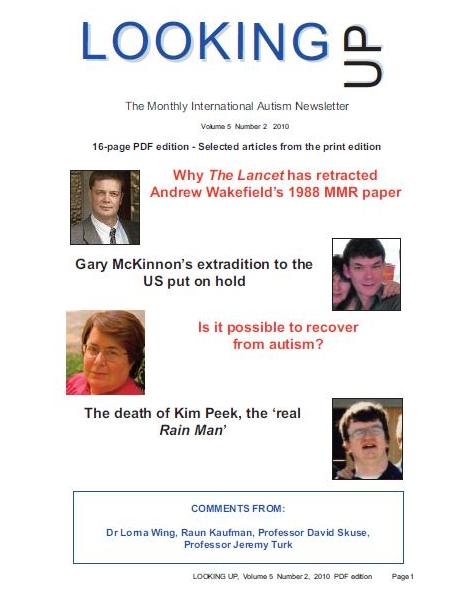
|
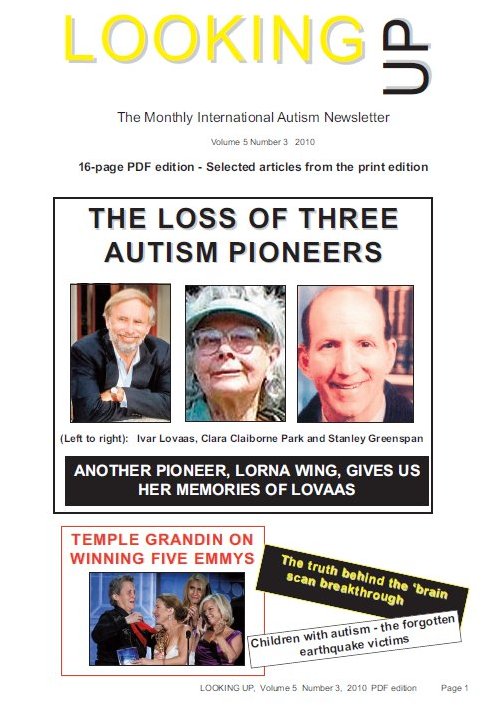
|
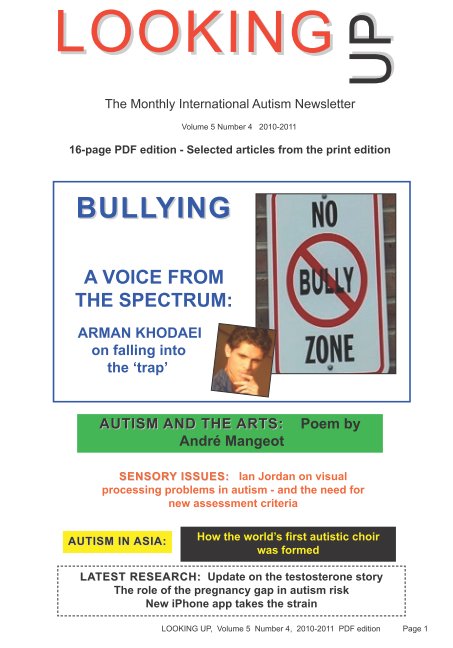
|
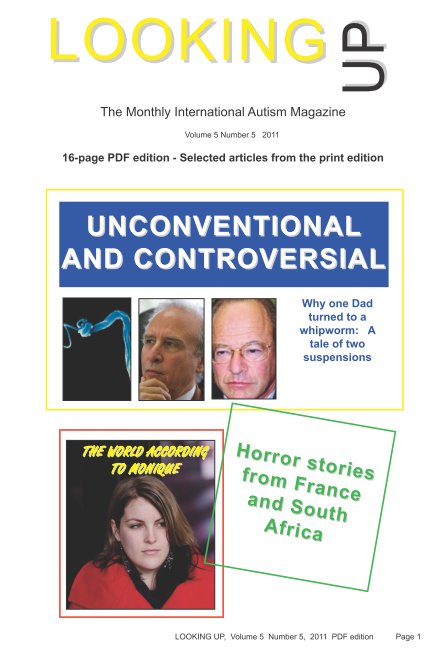
|
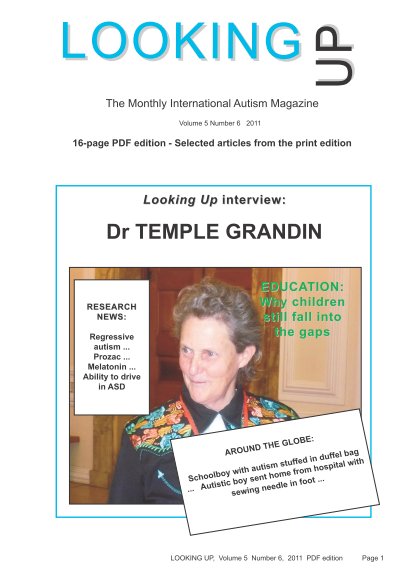
|
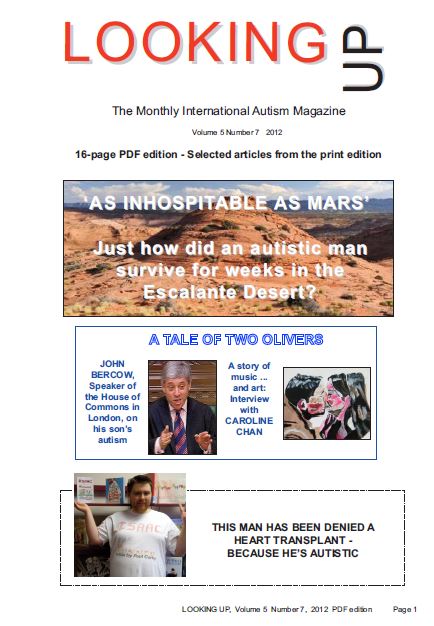
|
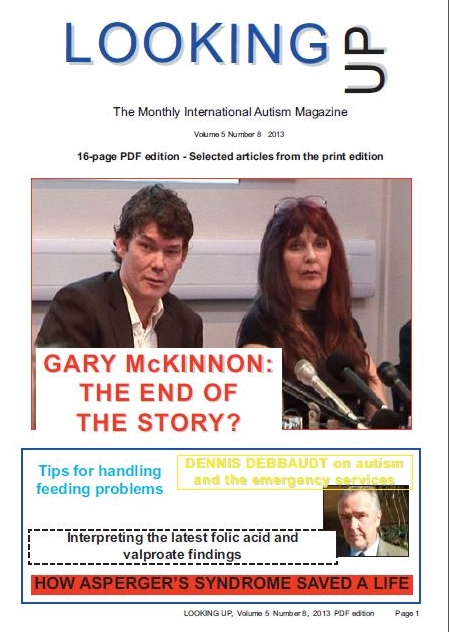
|
| Home page | Subscribe (print edition) | Selected articles | Our publications | Our mailing lists |
| PDF edition | Subscribe (PDF edition) | Back issue contents | Autism books | Contact us |
From Volume 3 Number 9
ADAM
FEINSTEIN, Editor of LOOKING UP, visited Russia recently. During his
stay in
Moscow, he spoke with Sergei Morozov (SM) and his daughter, Svetlana
Morozova
(SVM), founders of Russia’s main autism association, Dobro (Kindness)
ADAM
FEINSTEIN: When was the Dobro
Association for Autistic Children set up and how is it funded?
SERGEI MOROZOV: Dobro was founded in 1989. Our organisation is a non-profit-making charity. Most of our money comes in the form of grants or donations from other organisations.
AF:
What are your chief activities?
SM: We try to supply parents with information. We have published 15 books and many articles in newspapers and journals. Sometimes, we appear on television and radio, but not so often. We also have a small group of students who work here. It’s very small now - 12 students - and we have three or four consultations a week with parents of children with autism in Moscow and from other parts of Russia.
AF:
Are parents in Russia bewildered when their
child is first diagnosed with autism? They certainly are in the West!
SVETLANA MOROZOVA: Parents are growing more informed every year. Before, they had no idea what autism meant. But the problem remains that they do not receive sufficient support from the education department. They do not know where to turn to get help.
AF:
We do have similar countries in some Western countries. The Education
Ministry
will pass the problem on to the Health Ministry, which passes it back
again.
SVM: We have exactly the same situation here in Russia.
SM: We have no legislation specifically for autism here. We have some laws referring to deafness and blindness. So even if parents receive the correct diagnosis, they do not find where to go. I am very close to this problem of staff shortages, because there are not enough professionals capable of working with children with autism.
AF:
Are there likely to be more teacher-training institutes in the future?
SVM: I hope so, because there is a serious need.
SM: We have made suggestions - like the setting up of a specific teaching department. We meet the authorities all the time - that’s my main duty, in fact!
AF:
And how do the authorities react at these
meetings?
SVM: Actually, we tried to establish a special centre. They did build a beautiful building in northern Moscow, and we were on the point of opening. We had about 30 staff. Then suddenly, they decided to change the whole programme: each teacher, they said, should run a class of five autistic children and should work with the same programmes as
children with mental retardation and normal children. We could no longer come to an agreement with them.
SM: We tried to explain that we did not want to have autistic children in the same class as those with mental retardation. So they came back to use and said: ‘OK, let’s say mental retardation but a less severe form, with an IQ higher than 50.’ They refused to have individual programmes or vocational training. Why not? But the worst thing, as Svetlana says, is that they wanted to have five autistic children to one teacher. Also, they did not want to teach young
children,
but start only after the age of
seven. All the professionals left the school. I believe the school is
still
running but it works with only the
easier children and they teach them in regular classes. They only give
them
five or six hours a week. This is simply not enough.
AF:
Do doctors here recognise autism as a
specific disorder?
SVM: In theory, they do. But there are no special standards.
AF:
Is diagnosis still a big problem, then?
SM: Yes, because we have different traditions from Western countries. First of all, there is the question of links between autism and mental retardation, and autism and schizophrenia. But I do not think that these theoretical aspects represent great obstacles to the development of practical work with autistic children.
AF:
What is the average age at which children are diagnosed with autism in
Russia?
SM: Sometimes, three, four or five, but the problem is the older range, because the traditional thinking here in Russia is that it is possible to diagnose autism above the age of 15 years. But this is not true. ICD-10 [the World Health Organisation’s classification dating from 1992] does not make any such distinction.
AF:
What about Asperger’s syndrome? Is that
diagnosed here in Russia?
SM: Yes. But it is difficult to state the official position. Is Asperger’s syndrome an autistic disorder, or is it separate?
AF:
What do you think?
SM: I believe that Lorna Wing’s concept of an autistic continuum is the best way of looking at this. And I believe Asperger’s can be included in this continuum.
AF:
I personally disagree with Tony Attwood when
he says that high-functioning autism and Asperger’s are one and the
same
condition.
SM: I think they are. Many articles have been published on both conditions, and I cannot see the difference.
AF:
I believe that many people with Asperger’s
have a greater tendency than those with HFA to want to make friends and
are
often distraught when they cannot do so.
SVM: I agree.
SM: Well, first of all we have to find the pathogenesis - until we achieve that, other questions of possible clinical differences between the conditions are impossible to answer.
AF:
You say that parents in Moscow are more
informed about autism today. Where do they get their information? From
the
Internet?
SVM: No, not really. Some parents who can read English try to find information that way. But usually they read books and articles in Russian.
SM: It is very difficult for them. There are many articles which are of low quality.
AF:
I presume that the situation as regards understanding
of autism is far worse in the rest of the former Soviet Union than in
Russia?
SVM: Thanks to grants, we have been able to travel to different parts of Russia. We have given workshops and lectures and we have found that there is absolutely no information about autism there. No one works with the kids. They just stay at home. Sometimes, they are accepted at ordinary kindergartens, but they just sit in a corner and nobody knows what to do with them. That is the big problem for autistic children outside Moscow. We are not too sure about the situation in other former Soviet republics. We know that they are trying to do something in Belarus, but things are moving very slowly and they have no money.
SM: We have information from Kazakhstan, but although they are trying to do something there, they do not have the right idea of what autism is.
AF:
In these countries where there is no support
for autistic children, where do they go?
SM: Into institutions. Or they just live with their families.
SVM: Even here in Moscow, some of our parents are told by their doctors to put their child into an institution, because they don’t have any future. It’s very sad. For some reason, the Russian government does not want to do anything for them - for the more difficult children, that is. For the easiest, the government wants to integrate them into mainstream schools. This is simply not possible in most cases. There is no integration strategy for them.
AF:
How many special schools for autism are
there in Russia?
SM: I know of only two state-run autism schools in the whole of Russia - one here in Moscow andthe other in St Petersburg. But no one could call themselves satisified with either school - the quality of the teaching is so low. We are a community organisation. We are ready to work towards the training of staff but we do not have enough money. I teach autism simultaneously at three universities in Moscow, but only 30 to 35 hours. Moreover, the information is very general, and does not deal with genuine practical guides to teaching children with autism.
AF: Once again, there is also a shortage of qualified teachers in the West - though of course nothing like to the same extent as in Eastern Europe. What about private autism schools? Have any appeared in the post-Communist era, as capitalism has taken hold here in Russia?
SM: We have never heard about such institutions.
SVM: I know of one, but it had just three children and I believe it closed down. There are some centres, however, such as the Centre for Curative Pedagogics, and they also teach children with autism, among other disorders.
SM: But they are very closed off. No one knows what they are doing.
AF:
What teaching method do most professionals use here in Russia?
SM: An eclectic one. We try to find the right approach for each child.
SVM: There is another method in Russia which is partly psychodynamic. It has been going about thirty years already. It is called an “emotional behavioural approach.” It is very popular. It is based on a very complicated theory of five levels of emotional relations. They believe that some of these levels are damaged in autism and that
these can be repaired through play therapy and other methods. Actually, that is how I began - psychologists trained me in this method. But then, when I worked with difficult children, I saw no results. By chance, I went to the United States and worked at Princeton’s Child Development
Institute.They actually use an ABA-type approach.
AF:
Well, I know that ABA [Applied Behavioural
Analysis] can work with some autistic children, but I do not like the
idea put
out that it is the only valid approach. That is clearly ignorant
nonsense.
SVM: I agree.
AF:
But returning to the Russian psychodynamic
approach, I must admit that I do not like the sound of that one! It
does
smack of the bad old “Bettelheim days,”
when autism was seen as an exclusively emotional disorder, not a
neurologial
one, and parents were blamed for their child’s autism. Do some doctors
in
Russia still tell parents that they are responsible?
SVM: No. Not at all.
AF:
I know that a strong distinction used to be
made in the former USSR between children seen as developmentally
delayed and
those with mental handicaps arising from
mainly organic causes. Does this distinction still apply today?
SM: Yes. Just a few days ago, we finished writing an article about atypical autism, as it is defined in ICD-10. Atypical autism, in almost every case, is organic in origin. But the levels may be different: the abnormalities could be neurological or molecular.
AF: You say that the government has a policy of integrating autistic children into mainstream schools. Do they get any support at these schools? Do they have any special assistants?
SVM: Not at all. If they are lucky, their teacher may be a friendly, patient person. There were two boys with autism in my class when I went to school. My brother was autistic and another boy was severely autistic and could not speak.
AF:
What proportion of children do you see like my son, who start to speak
and then
lose all their language?
SM: That is a difficult question, because some children use language for minimal communication - only in situations they know well.
AF:
Which communication systems do you use for
non-verbal children? PECS? Makaton?
SVM: We are trying to development individual systems. They are similar to PECS. But we are just starting with one boy here. He can point at cards now, but we want to go further.
AF:
Are you still influenced here in Russia by the old Vygotskyian
thinking? If so,
how does this affect special education?
SVM: Yes. The programmes are specially designed along these principles.
SM: Vygotsky and Luria did not write specifically about autism. But for example, if we work with secondary problems in autism, we may achieve better results than working with the primary problems, and this reflects Vygotsky’s thinking on children’s acquisition of language.
AF:
Are there any facilities for adults with
autism in Russia?
SM: That is a really terrible problem here. They do nothing for adults. The authorities decided, for many years, that autism was not an adult problem.
SVM : There are some programmes for adults, but they are non-profit-making and when the money runs out, they close down. Then the autistic adults either stay at home or go into institutions.
SM: We had a grandfather come here with an autistic grandson, and he did not know what to do with him after 18. The education system cannot cope after that age. We have tried to advise them, but it is a very difficult problem. Everywhere there is a massive problem trying to find co-operation between the educational, health and social services.
AF: What about the use of drugs here? Is is a problem? Or do you find medication can help in some cases?
SM: We use them only as a last resort.
SVM: We have two psychiatrists who come here every two weeks and parents can come in for consultations, if they want to.
SM: We seldom use neuroleptics, and only then in very low doses - almost homeopathic doses, in fact! We use these only in psychotic cases. We very seldom use haloperidol, for example. We try to help the brain to grow better. We use
vasoactive or neurocorrective drugs, but very rarely. Sometimes, we use immuno-correctives but again in very low doses - 0.5 doses a day at the most.
AF:
We have found that risperidone has stopped my
son breaking windows.
SM: We do sometimes use risperidone, but not here at the centre because most of our children are under 12. It is mostly used in hospitals. It does have serious side-effects: the weight goes up a great deal, for example.
AF:
What is your view of the controversy over a
possible link between the MMR vaccine and autism?
SM: It is very difficult to say whether the vaccine could be the origin of autism or whether autism could provide a good basis for a faulty vaccine action. But we cannot connect autism and vaccines.
AF:
Do you have the MMR vaccine here in Russia?
SM: Yes, we do, but we cannot prove a link. The manifestation of autism after a vaccine does not prove a link. There are many different changes in autistic children. Perhaps all these changes are the result of some organic damage to the brain.
AF:
As you probably know, we have many parents in
Britain who are now so scared about a possible link with the MMR that
they have
chosen to give their children the jabs separately or not at all, and
this has
led to a serious risk of a measles epidemic in some parts of the
country. Do
you have the same problem in Russia?
SM: We have very good criteria here in Russia about how to use vaccines and there are many reasons not to use them - for example, if a child has post-natal difficulties.
AF:
If you had to single out the one thing Dobro
needs most, what would it be?
SM: How to train staff, and for that we need to pay them adequately. Enthusiasm is a very good thing, but in my experience, after three years, enthusiasm begins to fade very quickly! It is very rare to find people like we have here. We have five adults here working with 12 children.
SVM: I was the director of a small school with five teachers between five and seven children. They came every day, five days a week, for six hours a day. That was an interesting experience.
SM: We would like to start up such a school again, but we have no buildings we can use.

|

|

|

|

|

|

|

|
| Current 40-page print edition issue | |||||||||||||||
|---|---|---|---|---|---|---|---|---|---|---|---|---|---|---|---|
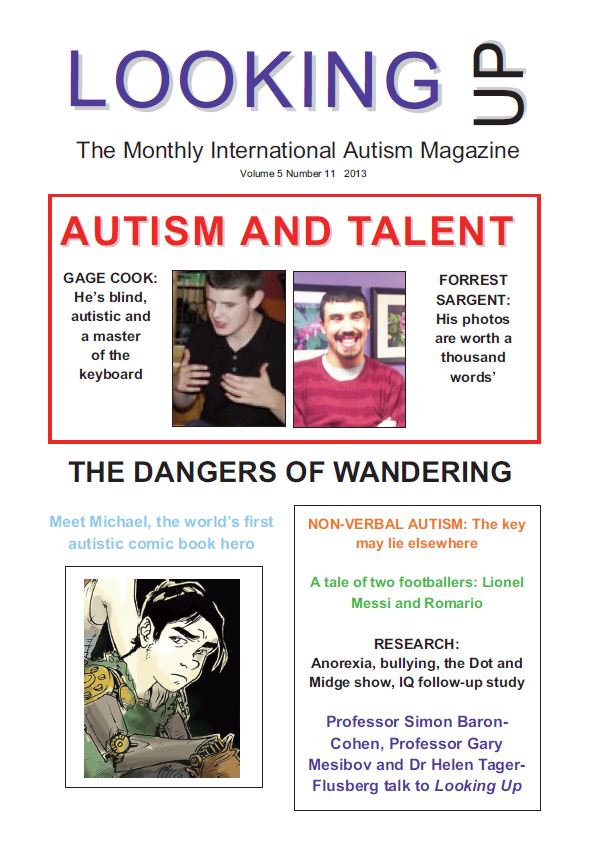
|
| ||||||||||||||
| PRINT EDITION BACK ISSUE CONTENTS AND FRONT COVERS | ||||||||||||||||||||||||||
|---|---|---|---|---|---|---|---|---|---|---|---|---|---|---|---|---|---|---|---|---|---|---|---|---|---|---|
| VOLUME 1, Number: | 1 | 2 | 3 | 4 | 5 | 6 | 7 | 8 | 9 | 10 | 11 | 12 | VOLUME 2, Number: | 1 | 2 | 3 | 4 | 5 | 6 | 7 | 8 | 9 | 10 | 11 | 12 | |
| VOLUME 3, Number: | 1 | 2 | 3 | 4 | 5 | 6 | 7 | 8 | 9 | 10 | 11 | 12 | VOLUME 4, Number: | 1 | 2 | 3 | 4 | 5 | 6 | 7 | 8 | 9 | 10 | 11 | 12 | |
| VOLUME 5, Number: | 1 | 2 | 3 | 4 | 5 | 6 | 7 | 8 | ||||||||||||||||||
| You can find our PDF EDITION CONTENTS AND COVERS on our PDF EDITION BACK ISSUES PAGE | ||||||||||||||||||||||||||
| Home page | Subscribe (print edition) | Selected articles | Our publications | Our mailing lists |
| PDF edition | Subscribe (PDF edition) | Back issue contents | Autism books | Contact us |